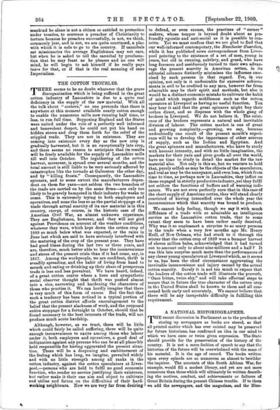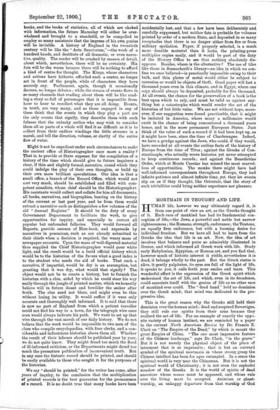A NATIONAL HISTORIOGRAPHER. Woks, and the books of statistics, all
of which are choked with information, the future Macaulay will either be over- whelmed and brought to a standstill, or be compelled to employ so many assistants that the impress of his own genius will be invisible. A history of England in the twentieth century will be like the " Acta Sanctorum,"—the work of a hundred hands, and destitute of all dramatic, or even narra- tive, quality. The reader will be crushed by masses of detail, about which, nevertheless, there will be no certainty. His fate will be the worse because there will be nothing to afford a kind of centre for thought. The Kings, whose characters and actions have hitherto afforded such a centre, no longer act in front of the people, while of characters they have scarcely any. Parliament, again, though it occasionally decrees, no longer debates ; while the stream of events flows in so many channels that reading about them will be like read- ing a story so full of personages that it is impossible from hour to hour to recollect what they are all doing. Events, in truth, are very many, and as those engaged in any of them think that the events in which they play a part are the only events that signify, they describe them with such fulness that the unlucky author who may wish to consider them all as parts of a whole will find it as difficult as it is to collect from their endless windings the little streams in a marsh, and tell the direction, volume, or clarity of the entire flow of water.
Might it not be expedient under such circumstances to make the ancient office of Historiographer once more a reality ? That is, to provide at State expense for the compilation of a history of the time which should give to future inquirers a clear, if thin and slightly formal, narrative, round which they could indulge the play of their own thoughts, or build up their own more brilliant speculations. Our idea is that a small office, a branch of the Record Office, which would not cost very much, should be established and filled with com- petent annalists, whose chief should be the Historiograph er. His assistants would collect and collate for him all documents, all books, narratives, and biographies, bearing on the history of the current or last past year, and he from them would extract a narrative such as distinguishes a few volumes of the old "Annual Register." It should be the duty of every Government Department to facilitate the work, to give opportunities for inquiry, and especially to correct all popular but unfounded fallacies. They would forward all Reports, provide essence of Blue-book, and supersede by narratives in pemmican, such as are already submitted to their chiefs when a decision is required, the weary mass of newspaper accounts. Upon the mass of well-digested material thus supplied the Chief Historiographer would pour white light, and the result would be a lucid official history which would be to the historian of the future what a good index is to the student who needs the aid of books. That such a narrative, if impartial, would be dry is an assumption, but granting that it was dry, what would that signify? The object would not be to create a history, but to furnish the historian with a clue, aided by which he could steer his way easily through the jungle of printed matter, which we honestly believe will in future daunt and bewilder the seeker after truth. The clue need not blaze, and might even be thin without losing its utility. It would suffice if it were only accurate and thoroughly well informed. It is said that there is now no part of England from which a patient traveller could not find his way to a town, for the telegraph wire once seen would always indicate his path. We want to set up that wire through the vast marsh of our daily history. We do not believe that the work would be impossible to two men of the class who compile encyclopazdias, with four clerks, and a con- siderable and industrious historian above them all. Whether the result of their labours should be published year by year, we do not quite brow. They might dread too much the flood of ill-informed criticism, or the Departments might dread too much the premature publication of inconvenient truth. But in any case the historic record should be printed, and should be easily available to those who sought it for the purposes of the historian.
We say "should be printed," for the writer has come, after years of inquiry, to the conclusion that the multiplication of printed records is the best guarantee for the permanence of a record. It is no doubt true that many books have been• accidentally lost, and that a few have been deliberately and carefully suppressed, but neither fate is probable for volumes printed by order of a modern State, and deposited in so many receptacles that there is no danger either from fire or from military spoliation. Paper, if properly selected, is a much more durable material than it looks, the printing-press multiplies copies easily, and it would be part of the duty of the History Office to see that nothing absolutely dis- appears. Besides, where is the alternative ? The use of tiles like those in Sennacherib's library—an idea in which we coh- fees we once believed—is practically impossible owing to their bulk, and thin plates of metal would either be subject to corrosion or would be objects of theft. Good paper will last a thousand years even in this climate, and in Egypt, where one copy should always be deposited, probably for five thousand. At all events, the chance for the preservation of a book is the best upon which to rely, and must be valid as against any- thing but a catastrophe which would render the art of the historian of but little value. We are not without hope, more- over, if our suggestion were found practicable, that it might be imitated in America, where many a millionaire would exult in the chance of being remembered a thousand years hence, and in the more permanent European States. Just think of the value of such a record if it had been kept up, as it might have been, since the time of Charlemagne. Indeed, we have a grudge against the Jews, who could, if they would, have recorded at all events the outline facts of the history of Europe from the time of Titus ; against the Greeks of Con- stantinople, who actually wrote histories yet never attempted to keep continuous records ; and against the Benedictine Order, which at Monte Cassino has missed the most marvel- lous of opportunities. The monks there might have had well-informed correspondents throughout Europe, they had infinite patience and almost infinite time, yet they let events slip on as if they thought, like Orientals, that the story of such trivialities could bring neither experience nor pleasure.







































 Previous page
Previous page